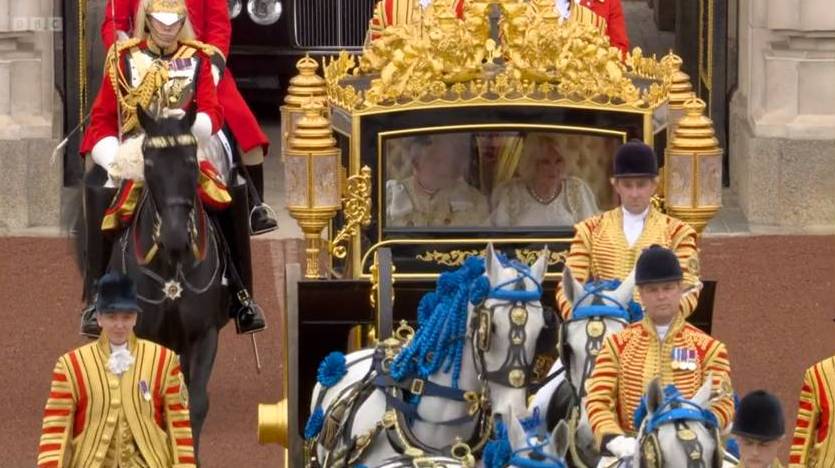 [source: TV]
[source: TV]
[This is an excerpt from an article in The Round Table: The Commonwealth Journal of International Affairs.]
While the monarchy underpins both the Australian constitution and the various state constitutions, it also has a role as part of celebrity culture as followed from Australia. Popular perceptions can be influenced by the way in which members of the royal family behave, including most recently the Duke and Duchess of Sussex (or is it California?). The death and funeral of the Queen had a big impact in Australia, reflecting her position as the country’s monarch for over seventy years.
With the Queen’s death on 8 September 2022, Charles instantly inherited the crown of the United Kingdom of Great Britain and Northern Ireland. This also made him King of Australia and all the other Crown realms – fifteen in total, including also Canada, New Zealand, eight Commonwealth states in the Caribbean, and three Pacific island countries. Each of the realms is a separate monarchy even though it is the holder of the British crown who is monarch in every instance. The proclamation of the new king at the time of the Queen’s death gave effect to this situation. At the coronation Charles will swear an oath to act according to law in each of his realms.
By Derek McDougall
Opinion – AUKUS: implications for Australia and other Commonwealth countries in the Indo-Pacific
Book Review – Tides that bind: Australia in the Pacific
Book Review: Australia and the World 1931-1936. Documents on Australian Foreign Policy
From an external perspective it is easy to exaggerate the significance of republicanism in Australia. Undoubtedly a majority of federal and state parliamentarians support some form of republicanism, including most Labor members and a significant number of Liberal-National Coalition members; the strongest supporters of constitutional monarchy are in the Coalition. The decision by the Reserve Bank (supported by the federal government) not to include an image of the new king on the new five-dollar note does not mean that there will suddenly be a rush to a republic. In fact, the Queen had only been on the note since 1992; an image of Charles III will be on the coinage. As the 1999 referendum indicated, changing the Australian Constitution is notoriously difficult, with a successful referendum requiring a majority of votes in the country as a whole and in a majority of states (four out of six); since federation in 1901 only eight out of 44 proposals have passed.
The focus for constitutional change in Australia currently is the proposal for an Aboriginal and Torres Strait Islander Voice to parliament and government, giving indigenous people both constitutional recognition and a means of influence on issues relating to their wellbeing. This matter will be put to a referendum before the end of 2023. The republican issue is on the backburner while this issue proceeds. Should the Voice referendum succeed, and the Labor government continue in office after the next federal election in 2025, there is likely to be renewed attention to republican proposals. Should the Voice referendum fail, this would also be a setback for republican hopes given that such an outcome would confirm the difficulty of constitutional change in Australia.
Emeka Anyaoku: King Charles III’s Popularity Will Grow, Anti-Monarchy Protests A Minority View
The Realm may decline, but the Commonwealth will live on
‘Not my king’: New head of the Commonwealth faces a difficult future
Whatever the outcome of the Voice referendum, Labor governments are likely to make occasional changes that advance republican symbolism at the expense of monarchical symbolism (as with the five-dollar note). This will happen even if formal constitutional change to a republic does not occur. Monarchy is likely to continue playing a small but continuing role in Australian politics and culture, with occasional royal visits even if Australia were to become a republic.
In the meantime, given the new king’s commitment to a multi-faith and multicultural United Kingdom and Commonwealth, is there any scope for an indigenous smoking ceremony (with didgeridoo accompaniment) at Westminster Abbey?
Derek McDougall is Professorial Fellow, School of Social and Political Sciences, University of Melbourne, Melbourne, Australia.



